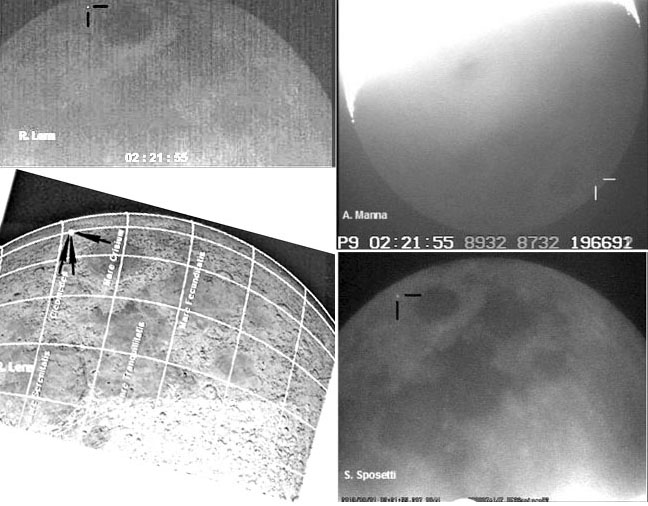Difference between revisions of "August 8, 2013"
| Line 1: | Line 1: | ||
__NOTOC__ | __NOTOC__ | ||
=Caught One!= | =Caught One!= | ||
| − | |||
<!-- ws:start:WikiTextHeadingRule:0:<h1> --> | <!-- ws:start:WikiTextHeadingRule:0:<h1> --> | ||
<!-- ws:start:WikiTextLocalImageRule:6:<img src="/file/view/LPOD-Aug8-13.jpg/443851464/LPOD-Aug8-13.jpg" alt="" title="" /> -->[[File:LPOD-Aug8-13.jpg|LPOD-Aug8-13.jpg]]<!-- ws:end:WikiTextLocalImageRule:6 --><br /> | <!-- ws:start:WikiTextLocalImageRule:6:<img src="/file/view/LPOD-Aug8-13.jpg/443851464/LPOD-Aug8-13.jpg" alt="" title="" /> -->[[File:LPOD-Aug8-13.jpg|LPOD-Aug8-13.jpg]]<!-- ws:end:WikiTextLocalImageRule:6 --><br /> | ||
| − | <em>images and location map from [http://www.lunar-captures.com//Selenology_Today/selenologytoday33.pdf Selenology Today #33] (Enhanced by CAW)</em><br /> | + | <em>images and location map from [http://www.lunar-captures.com//Selenology_Today/selenologytoday33.pdf" rel="nofollow Selenology Today #33] (Enhanced by CAW)</em><br /> |
<br /> | <br /> | ||
On August 1, 2013 at 02:21:55.7 UT, a small meteoroid impacted the Moon's surface. The kinetic energy of the impact transformed into thermal energy also caused a short and intense flash of light that was detected by telescopes by R. Lena, A. Manna and S. Sposetti. The simultaneity of the flash and the same position on the lunar surface indicates it is an impact. The event described above was observed by Raffaello Lena (GLR group, Rome Italy) with a refractor 130 mm and with a video camera Mintron. Andrea Manna observes from Cugnasco (Switzerlnd) and this morning decided to with a Schmidt Cassegrain 200 mm and a camera watec 120N+. Stefano Sposetti (Gnosca, Switzerland) detected the flash using two telescopes: Refractor 150 mm and SC C11" equipped with watec 902H2 cameras. The two observatories in Switzerland are at a distance of 10.0 km. The observatory in Italy ( Rome ) is at a distance of 558 km from Gnosca. Time synchronicity of the various files is assured by using a GPS time inserters (KIWI-OSD) and an Atomic Clock Synchronization protocol. The duration of the flash correspond to 0.08s and reached a peak brightness of 8.3 ± 0.7 mag. The selenographic coordinates of the lunar impact flash are determined to 73° ± 4° E and 27° ± 3° N, near the crater Seneca C. The examined impact flash probably corresponds to a α-Capricornids shower exhibiting favourable impact geometry on the impact date.<br /> | On August 1, 2013 at 02:21:55.7 UT, a small meteoroid impacted the Moon's surface. The kinetic energy of the impact transformed into thermal energy also caused a short and intense flash of light that was detected by telescopes by R. Lena, A. Manna and S. Sposetti. The simultaneity of the flash and the same position on the lunar surface indicates it is an impact. The event described above was observed by Raffaello Lena (GLR group, Rome Italy) with a refractor 130 mm and with a video camera Mintron. Andrea Manna observes from Cugnasco (Switzerlnd) and this morning decided to with a Schmidt Cassegrain 200 mm and a camera watec 120N+. Stefano Sposetti (Gnosca, Switzerland) detected the flash using two telescopes: Refractor 150 mm and SC C11" equipped with watec 902H2 cameras. The two observatories in Switzerland are at a distance of 10.0 km. The observatory in Italy ( Rome ) is at a distance of 558 km from Gnosca. Time synchronicity of the various files is assured by using a GPS time inserters (KIWI-OSD) and an Atomic Clock Synchronization protocol. The duration of the flash correspond to 0.08s and reached a peak brightness of 8.3 ± 0.7 mag. The selenographic coordinates of the lunar impact flash are determined to 73° ± 4° E and 27° ± 3° N, near the crater Seneca C. The examined impact flash probably corresponds to a α-Capricornids shower exhibiting favourable impact geometry on the impact date.<br /> | ||
<br /> | <br /> | ||
| − | <em>[mailto:gibbidomine@libero.it Raf Lena]</em><br /> | + | <em>[mailto:gibbidomine@libero.it" rel="nofollow Raf Lena]</em><br /> |
<br /> | <br /> | ||
<hr /> | <hr /> | ||
Revision as of 22:48, 4 January 2015
Caught One!

images and location map from " rel="nofollow Selenology Today #33 (Enhanced by CAW)
On August 1, 2013 at 02:21:55.7 UT, a small meteoroid impacted the Moon's surface. The kinetic energy of the impact transformed into thermal energy also caused a short and intense flash of light that was detected by telescopes by R. Lena, A. Manna and S. Sposetti. The simultaneity of the flash and the same position on the lunar surface indicates it is an impact. The event described above was observed by Raffaello Lena (GLR group, Rome Italy) with a refractor 130 mm and with a video camera Mintron. Andrea Manna observes from Cugnasco (Switzerlnd) and this morning decided to with a Schmidt Cassegrain 200 mm and a camera watec 120N+. Stefano Sposetti (Gnosca, Switzerland) detected the flash using two telescopes: Refractor 150 mm and SC C11" equipped with watec 902H2 cameras. The two observatories in Switzerland are at a distance of 10.0 km. The observatory in Italy ( Rome ) is at a distance of 558 km from Gnosca. Time synchronicity of the various files is assured by using a GPS time inserters (KIWI-OSD) and an Atomic Clock Synchronization protocol. The duration of the flash correspond to 0.08s and reached a peak brightness of 8.3 ± 0.7 mag. The selenographic coordinates of the lunar impact flash are determined to 73° ± 4° E and 27° ± 3° N, near the crater Seneca C. The examined impact flash probably corresponds to a α-Capricornids shower exhibiting favourable impact geometry on the impact date.
" rel="nofollow Raf Lena



